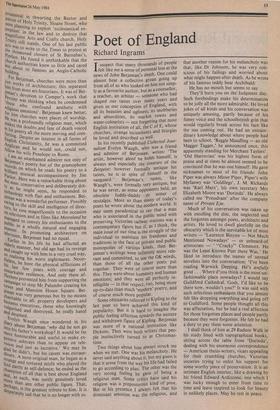Poet of England
Richard Ingrams
Isuspect that many thousands of people felt like me a sense of personal loss at the news of John Betjeman's death. One could almost hear a collective groan going up from all of us who looked on him not simp- ly as a favourite author, but as a counsellor, a teacher, an arbiter — someone who had shaped our tastes over many years and given us our conception of England, with all its beauties and ugliness, its snobberies and absurdities, its market towns and water-colourists — not forgetting that most English institution of all, the C of E, whose churches, strange incumbents and liturgies he loved and described so well. In his recently published Collected Jour- nalism Evelyn Waugh, who was a friend and admirer of Betjeman, writes: 'The artist, however aloof he holds himself, is always and especially the creature of the Zeitgeist: however formally antique his tastes, he is in spite of himself in the vanguard.' Betjeman's tastes, like Waugh's, were formally very antique, but he was never, as some opponents held, an obsolete fuddy-duddy or miner of nostalgia. More so than many of today's poets he wrote about the modern world. It may seem paradoxical to say that a man who is associated in the public mind with preserving Victorian railway stations was a contemporary figure but if, as I think, the main issue of our time is the struggle of the individual to maintain his freedoms and traditions in the face of private and public monopolies of various kinds, then Bet- jeman's writings were infinitely more rele- vant and committed, to use the OK words, than those of all the other poets put together. They were of course more than this. They were about humanity and human emotions; and they were all perfectly in- telligible — in that respect, too, being more up-to-date than much 'modern' poetry, and of course much more popular. Some obituaries referred to Kipling as the last poet to have achieved this kind of popularity. But it is hard to imagine the public feeling affection towards the austere and withdrawn figure of Kipling. Betjeman was more of a national institution like Dickens. They were both writers that peo- ple instinctively turned to at Christmas- time.
Two things about him always struck me when we met. One was his melancholy. He never said anything about it, but my guess is that it arose from the way his life had failed to go according to plan. The other was the very strong feeling he gave of being a religious man. Some critics have said his religion was a preposterous kind of pose. But in his presence I always felt that his dominant emotion was the religious, and that another reason for his melancholy was that, like Dr Johnson, he was very con- scious of his failings and worried about what might happen after death. As he wrote of his famous teddy bear Archibald: He has no mouth but seems to say
They'll burn you on the Judgment day. Such forebodings make his determination to be jolly all the more admirable. He loved jokes of all kinds and his conversation was uniquely amusing, partly because of his funny voice and the schoolboyish grin that would regularly break across his face like the sun coming out. He had an extraor- dinary knowledge about where people had been to school. 'Reggie Maudling — an old Magger Tagger,' he announced once, this apparently standing for Merchant Taylors'. 'Old Harrovian' was his highest form of praise and at times he almost seemed to be convinced that he was one himself. He gave nicknames to most of his friends: John Piper was always Mister Piper, Piper's wife Myfanwy was `Goldilegs', J. M. Richards was 'Karl Marx', his own secretary Mrs Elizabeth Moore was `Dorinda'. He always called me 'Pressdram' after the company name of Private Eye.
Much of his conversation was taken up with extolling the dim, the neglected and the forgotten amongst poets, architects and artists. He loved to dwell gleefully on the obscurity which is the inevitable lot of most writers — 'Laurence Binyon — Not Much Mentioned Nowadays' — or unheard-of aristocrats — "Cracky" Clonmore. He was the Least Known Peer there Was.' He liked to introduce the names of unread novelists into the conversation: 'I've been reading Warwick Deeping. He's awfully good . . . Where d'you think is the most un- fashionable place nowadays? I would say Guildford Cathedral. Gosh, I'd like to be there now, wouldn't you?' It was said with such infectious enthusiasm that you almost felt like dropping everything and going off to Guildford. Some people thought all this was affectation, but he had a real affection for those forgotten places and people partly because they were forgotten. He felt he had a duty to pay them some attention.
I shall think of him at 29 Radnor Walk in his study lined with topographical books, sitting across the table from `Dorinda', dealing with his enormous correspondence — American thesis-writers, vicars appealing for their crumbling churches, Victorian societies trying to enlist his support for some worthy piece of preservation. It is an intimate English interior, like a drawing by his friend Edward Ardizzone, one which I was lucky enough to enter from time to time and leave inspired to look for beauty in unlikely places. May he rest in peace.














































 Previous page
Previous page